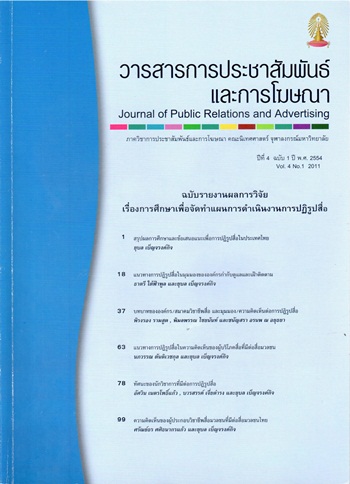บทบาทขององค์กร/สมาคมวิชาชีพสื่อ และมุมมองความคิดเห็นต่อการปฏิรูปสื่อ
Main Article Content
Abstract
This research entitled “The Role of Professional Organizations/Associations of the Media and their Perspectives on Media Reform” is a qualitative research. It has the following objectives: 1) to study the role of professional media organizations/associations in the course of media reform, emphasizing on the issues, approaches taken towards reforming media, starting from the first wave of media reform (after 1992) and the new wave of the reform and 2) to explore the perspectives and opinions of representatives from key media professional organizations/associations after the announcement of the National Reconciliation Plan in 2010. Research data is collected through in-depth interviews with 16 leaders of these professional organizations/associations and documentary research about activities related to media reform by 12 leading media professional organizations/associations.
The research has these findings. Professional media organizations/associations have organized activities related to media reform to address these major issues: 1) rights and liberties of the media; 2) laws which facilitate the operation of media in a democratic regime; 3) ethics and responsibility of the media; 4) status and legal rights of new media. A common issue shared by conventional and new media is freedom of expression and the right to know. It is also found that professional media organizations/associations have used the following approaches in endeavors related to media reform: 1) movement towards legal and policy change that will pave the way towards structural change of media institutions in Thai society; 2) promotion of professional practices in the media; 3) creation of new independent and democratic media as well as strengthening of existing ones; 4) promotion of media literacy and social monitoring of media.
Meanwhile, the study finds that professional media organizations/associations have the following views about media reform after the announcement of the National Reconciliations Plan by Prime Minister Abhisit Vejjajiva in 2010. Major structural problems that need reform include state ownership of media especially broadcasting, domination of media market and influence on content, professionalism and ethical standards of media, state regulatory mechanism of media which emphasizes control and penalty; and inadequate work benefits and welfare in media industry. Furthermore, media practices which are viewed as problematic include the following: 1) substandard quality of media professionals in the news media; 2) partiality and bias of media as reflected through political agenda-setting and propaganda; 3) inability of media to provide diverse public sphere in society.
As for mechanisms towards effective media reform in the future, representatives of professional media organizations/associations recommend the following: 1) establishing of co-regulatory measures in which self-regulation of media organizations/associations can be complemented by regulatory authority of independent regulatory organization of the state; 2) establishing of truly independent regulatory agency; 3) promotion of media literacy and social monitoring of media; and 4) accessibility and transparency of self-regulatory procedures to the public. In addition, they view the following as major problems and obstacles for media reform insofar as professional media organizations/associations are concerned: 1) legal status of professional media councils; 2) difficulty in recruiting quality personal in the news media; 3) lack of awareness of media professional regarding self-regulation; 4) media consumption culture that lacks critical thinking and monitoring; 5) emergence of new professional associations that tend to be interest-based rather than professional ethics-based; and 6) Jack of unity and strength in self-regulatory procedures.


